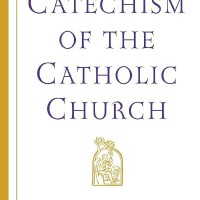Meditation ideas on the Glorious Mysteries of the holy rosary for dealing with all the troubling news the world is encountering right now.
Lately there has been a lot of news that has many people thinking the world is falling apart. We hear of people suffering from natural disasters across the globe, atrocities committed by groups like ISIS across the Middle East, silly presidential election news (Trump? Hillary Clinton’s favorite ice cream flavor?), and troubling social/political news about Supreme Court rulings on gay marriage and ObamaCare. Basically, if you’re looking to get worried and upset about something, you don’t have to look much further than your Facebook news feed to grow a few gray hairs.
To me, praying the rosary is all about gaining perspective. And I think everyone could use a little perspective right now. I try to remember that the world has never been a perfect place and has been marked by problems both natural and man made. However, we live in a time when news has never been more accessible which means we get more bad news at an accelerated pace. Or we get a distorted view of the scope of outrage or support on any given issue. But thinking society is falling apart isn’t new. Mankind has always had its share of problems.
Picture back to the time Jesus lived. If Facebook existed then people’s walls would have been filled with complaints about cheating tax collectors, Roman occupation, and corrupt pharisees. Furthermore, people were probably praying for the same types of solutions we pray for today. Something to the tune of “Please God, make all our problems go away.”

Jesus did not come into this world to magically change the world with a wave of his hand. He didn’t make all the Jews’ problems go away. But he did answer the people’s prayers. He did that not by making things easier but by challenging people to look beyond the troubled state of the world and their immediate, physical needs. He wanted them to concentrate more on the state of their souls rather than the actions of Cesar. For example, he told the rich man to look beyond earthly wealth and to gain riches in Heaven by being charitable (Mark 10:17-31). He said that those who are persecuted in this world will find glory in Heaven (Matthew 5:10). He said that we all have to take up our crosses in this life so that we may find comfort in the next (Matthew 16:24-27).
In that spirit, let’s take a look at the Glorious mysteries of the rosary and meditate on gaining a more heavenly perspective instead of dwelling so much on the today’s troubling issues.
#1. Live for something more than this earthly world
The First Glorious Mystery is about Jesus rising from the dead. The perspective gained from this mystery is that our earthly death is not an end. Jesus’ crucifixion and death was only a transition from his earthly life to his true, heavenly one. Jesus’ rising proved that there is so much more to us than the physical realities of this world.
When we think about all the injustice, death, and suffering in this world we should remember that none of it will persist after our earthly death as we rise to new life in Jesus’ kingdom. And while a lifetime of pain and suffering may seem like an awfully huge cross to carry, it isn’t even a measurable instant of time compared to the eternal joy and happiness Jesus prepared for us in Heaven through his resurrection.
#2. Pray for those have fallen
The Second Glorious Mystery is about Jesus ascending into Heaven. The perspective gained from this mystery is that Jesus sits at the right hand of God, the Father Almighty, and will judge the living and the dead. This is important to understand because we need to pray for the repentance and conversion of those who live in sin and cause so much scandal, misery, and unhappiness. It may seem easy to complain and become stressed over others’ misdeeds. It’s also easy to ignore them and focus only at our own salvation. But we do need to pray for them and always be an example to the world of Jesus’ Truth. Because everyone, including those who live in sin, will one day stand before the Lord with their sins in plain view. Since we are called to love one another, we should do whatever is possible so that everyone, saint and sinner alike, will enjoy eternal happiness in Heaven.
#3. Let the Holy Spirit guide you
The Third Glorious Mystery is about the Holy Spirit coming to the apostles after Jesus’ ascension. We live in a difficult world but we can look to the Holy Spirit to give us the strength and courage to persevere and maybe even change the hearts of others. I don’t think any of the apostles would have thought that they were going to change the world when Jesus first called them to put down their nets and become fishers of men. But with the guidance of the Holy Spirit they did just that by boldly venturing out and spreading Jesus’ truth.
We too may not think that there is much we can do when we see what appears to be impossible situations to fix or the deep seated hatred in people’s hearts. But the Holy Spirit does give us the power to live according to Jesus’ truth and to lovingly bring people into God’s grace. Like when Jesus was here in this world, he did not provide a quick fix to humanity’s problems. Similarly, the Holy Spirit won’t give us a quick fix either. But if we have faith and let the Holy Spirit guide us, we can personally thrive and bring others to know Jesus Christ.
#4. Follow our mother Mary’s roadmap for happiness
The Fourth Glorious Mystery is about Mary’s assumption into Heaven. God had a very special plan for Mary and her assumption shows just how revered and elevated she is. She was not only set aside to be the vessel through which God would manifest himself in human form, but she was also set aside to be our guide and mediatrix after her earthly death. Like with the Third Glorious Mystery, the perspective we should gain from this mystery is that Mary is always there to help guide us closer to her son’s love. She has appeared many times with a message of hope, love, and a call to action for conversion. Over the generations, she has laid out a roadmap of prayer, fasting, and repentance which we should follow. While it’s easy to get down and think nothing we do can do that will make much difference, Mary says otherwise. And we should all listen to our mother.
#5. Remember that you are protected
The Fifth Glorious Mystery is Mary’s coronation in Heaven. We have to understand that there are evil force at work. And Satan and his minions are playing the long game where they want you to focus all your energy on this world in the hopes that you will be led astray and become his slave for eternity. He wants you to “go with the crowd” even if what is popular in modern society goes against God’s plan. Or he wants you to fall into despair, blame God for all that is wrong with the world, and turn away from your faith. But Mary is a powerful queen who reigns in Heaven. When we accept and live for God’s Heavenly Kingdom then we fall under Mary’s protection against evil and Satan’s influence. No matter what transpires in our world we know that we will have protection for what matters most — our eternal soul.


































































